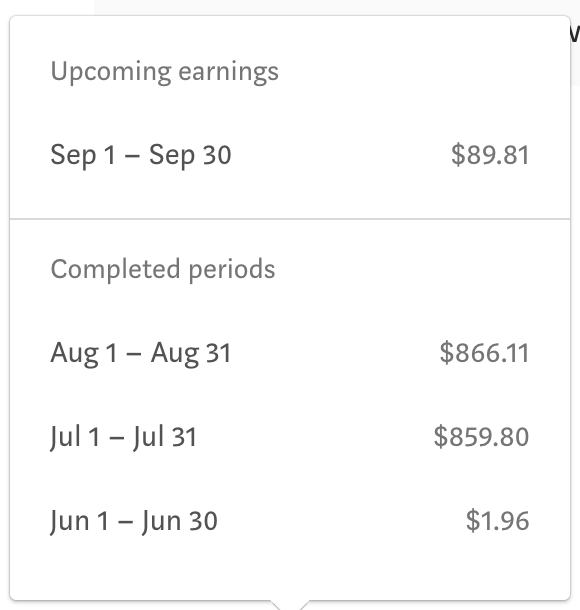3 Epiphanies I Had When I Finally Started

James Clear, the writer of Atomic Habits, said it best:
We often avoid taking action because we think, “I need to learn more”, but the best way to learn is often by taking action.
I had been thinking and reading about online writing for the longest time, but all the usual fears and insecurities held me back from starting.
Once I did, it quickly became clear how much I’ve been overcomplicating things in my head.
Here’s what I discovered.
1# You have no idea what will resonate with others
“There are so many writers out there already. Who would be interested in what I have to say? Plus, I don’t have any original ideas.” — Me, 2015–2020.
Since signing up for the Medium Partner Program 4 months ago, I have posted 11 articles and earned 1,800 USD.
67% of those earnings come from just two articles: My Life Tech Stack and a guide on PARA, a digital filing method.
These are also the two articles that I almost didn’t finish because I thought they wouldn’t be interesting to anyone.
Instead, I pushed myself to publish them, keeping the wonderful concepts The Taste Gap (by Ira Glass) and The Creativity Faucet (Julian Shapiro) in the back of my mind.
Since then:
- Over 17.000 views for each
- Forge, a popular publication on Medium, reached out asking to feature the PARA article
- Medium reposted both articles on Twitter to their 2.2m followers

Similarly, posts that took me hours to write barely got any views. A review of one of my favourite non-fiction books has earned me a whopping 68 cents.
You have no idea what will resonate with others.
Someone else, in their own journey, doesn’t know yet what you know. They have not read the same books or articles and don’t use the same apps and tools. The things I thought would be too obvious or too niche ended up getting the most attention.
I am happy that I’ve learned this lesson so early on in my writing. If I hadn’t, it would have been hard to keep trying and keep experimenting. I would’ve been discouraged by the low views and low earnings after putting in so much time and effort.
In the beginning, it’s crucial that you don’t self-edit or self-reject too much. Instead, try whatever comes to mind and excites you, even if you think it’s boring or cringy. The only catch is that you have to share it publicly. That’s the only way to find out if it resonates.
2# You’ll only think of a better way to do it after it’s done
A big reason why it took me so long to start writing was my obsession with having the ‘perfect plan’ laid out.
I now see how that is not only impossible — it’s completely unnecessary.
Motivation comes when you start. The best ideas come while working on multiple things. You get familiar with the tools and platforms; you figure out what works and what doesn’t work for you.
It is impossible to get better and look good at the same time. — Julia Cameron
Sure, you’ll make mistakes and spend time on things that don’t work out. But you’ll learn, and most importantly, you’ll gain confidence.
I felt I needed a fancy website before posting anything publicly, so I spent money on a 1 year Squarespace subscription. A few weeks in, I realised I should be writing on a public platform to reach readers, so I started writing on Medium. After that, I stopped posting on my Squarespace website.
Then, I learned that Medium is a wonderful platform for distribution, but it should not be my core platform for publishing. It’s better to publish on my own site first.
The problem was that I didn’t like my Squarespace website and was limited in the changes I could make to the design. On top of that, I now wanted a platform that was more focused on publishing and newsletters.
Long story short, I’ve now decided to switch my personal domain from Squarespace to Ghost. That’ll be my main publishing platform, and then I’ll repost to Medium.
That’s about 6 months of Squarespace subscription lost and an additional expense for Ghost.
Time lost, money lost. It’s annoying, but I learned so much from going through this process.
Start before you’re ready and figure things out as you go. And most importantly, be open to changing the plan when something isn’t working.
Build your way forward.
3# You don’t need other people’s advice as much as you think you do
It feels like every writer who has earned 100$ on Medium needs to write an article about how to do it.
Write every morning. Never wait for motivation, be disciplined. There’s no such thing as writer’s block; push through. Find your niche. Don’t find your niche. Publish 3 times per week. Publish every day. Publish multiple times per day.
While this advice is well-intentioned, I don’t think it is helpful. I spent way too much time going through all those articles full of conflicting advice, feeling intimidated and overwhelmed.
By all means — read it, get inspired, take notes. Just don’t let it keep you from writing yourself.
We all have different styles, lives and goals. It’s only once you start and experiment that you’ll discover what works for you.
I have found that I like to write every day. This can be in the morning, afternoon or evening, and it depends entirely on my schedule and mood.
I set a timer for at least 30 minutes, depending on the time I have. In that time, I write. Once the time is up, I stop writing, even if I feel I could keep going. I’ve noticed that stopping on a high makes it so much easier to sit down and start the next day again.
I often get stuck while writing. What exactly am I trying to say? What should be the key takeaways? How can I best structure this? It doesn’t come very natural to me. In the beginning, I’d be very hard on myself and force myself to work it out. “You need to post this today!” I’ve now accepted that that is not my style. I don’t have the time or mental energy to do that.
By writing every day and publishing whenever I can, I have the flexibility to work on multiple drafts simultaneously. Now, when I’m stuck, I close the draft and work on something else. I think about it away from my computer. I read through the draft on my phone while out on a walk. This seems to help me think of new ways to say or structure things.
The only way to find out what works for me is by trial and error, and it’ll always be a work in progress.
How about you?
As I was writing this, I realised that these lessons don’t apply to just writing.
I’m 99% sure that there is something in your life that you are overcomplicating right now.
What is that? What is one thing you can do to get started, no matter how small? I guarantee that you’ll be surprised by what you discover.
Member discussion